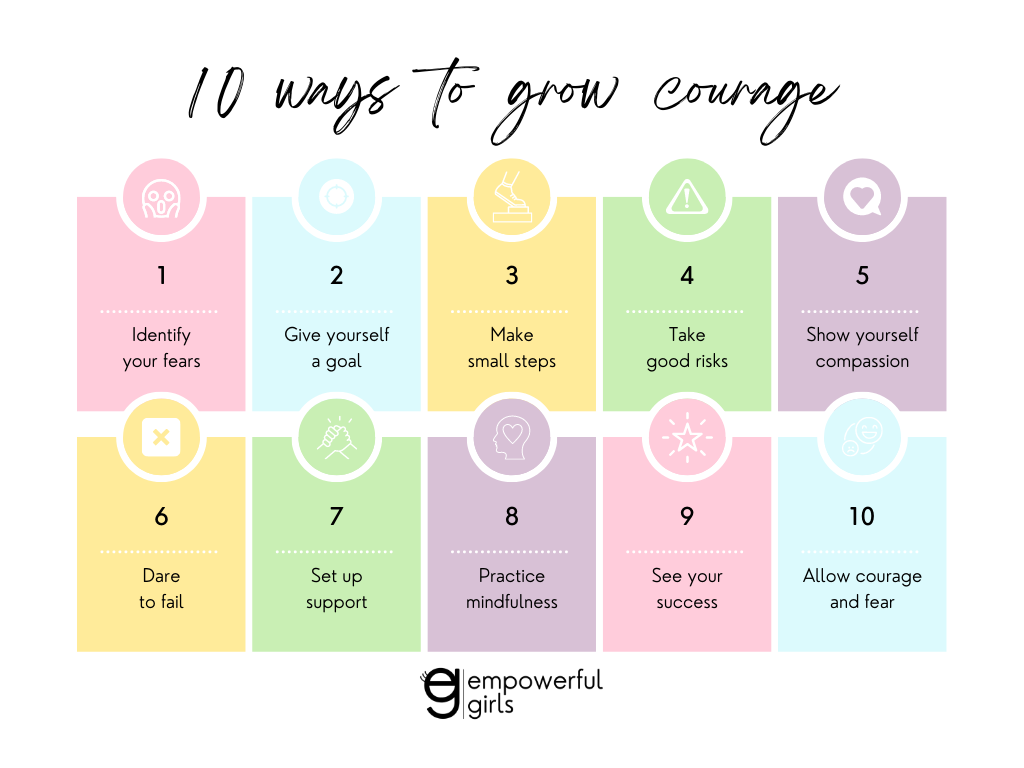
What Is Courage
Recently a girl asked for an episode on courage, and I thought a lot of you may be interested, too. I want you to ponder for a moment, what does courage mean to you? What does it look like? For me, courage means taking action even if you’re afraid. Like Elyse Meyers says, “Do it scared.” Examples of courage are all around us. Courage looks like standing up for someone, going against the odds, taking risks, facing your fears, doing the right thing, admitting you were wrong, taking responsibility, failing and trying again. Courage takes inner strength and mental stamina.
Types of Courage
There are different types of courage we experience:
Physical courage: the courage to protect to help or someone, or courage when facing a physical challenge. For instance, fire fighters need courage, doing something dangerous carefully like rock climbing, or playing a sport takes courage.
Moral courage: the courage to do what’s right, even when it’s harder, or when you’re outnumbered. Examples include speaking out about issues or injustice, or standing up for what you believe in. We’ve seen a rise in moral courage over the past few years, and it’s a nice change.
Emotional courage: the courage to face your fears, or even feel through difficult emotions. It might involve talking about something personal, sharing your feelings even if you could be rejected, or asking for help from a friend/parent/counselor. That takes courage.
Intellectual courage: the courage to question and think for yourself. This reminds me of the book Think Again, by Adam Grant–it made me rethink everything I thought I knew. Intellectual courage uses critical thinking, considering multiple perspectives, and being willing to change your mind. Scientists, political leaders, and everyday people need intellectual courage.
Social courage: the courage to reach out to people and build relationships. For example, trying to make new friends, being yourself even if people don’t like you, going to social events even though you’re not very outgoing.
Can you think of times in your life when you needed physical courage, moral courage, emotional courage, intellectual courage, or social courage? Maybe you realized that you use courage a lot more often than you thought. Courage isn’t something you either have or you don’t; courage is a skill that can be strengthened through practice–practice makes progress, right?
How to Grow Courage
Here are some ideas to help you develop courage:
- Identify Your Fears. What things, situations, or events make you feel nervous or scared, and that you want to develop more courage for? If you’re not sure, take some time to reflect on times you felt hesitant, reluctant, or anxious, and freely write out your thoughts. It takes courage to recognize your fears, and naming them is the first step to overcoming them.
- Give Yourself a Goal. commit to growing courage in one of the fears you identified. It could be trying something new, like playing a sport; strengthening your speaking skills with a debate class; taking on your stage fright by trying out for the school play, or daring to lead by running for student council. The goal should challenge you to step outside of your comfort zone, that’s where courage builds and growth happens.
- Make Small Steps. With your new goal set, break it down into smaller steps to achieve your goal. For a new sport, you could create a practice schedule, set up a scrimmage with friends, and work with a teammate to strengthen your skills. Remember SMART Goals from episode 06? Relisten to that to help you make a plan to reach your goal.
- Take Good Risks. (different from bad risks or risky behavior) Good risks stretch you, teach you to trust yourself, and show you what you’re capable of achieving. If you only play small, you’ll never see how high you can reach. So find out, and you’ll probably find some courage, too.
- Show Yourself Compassion. Treat yourself like you would treat a close friend. Be aware of your self-talk, and be kind as you work toward your goal. You’ll also need to be patient with yourself, remember that you’re trying to develop new abilities–and that takes time.
- Dare to Fail. Everyone makes mistakes and fails sometimes. Instead of kicking yourself when you’re down, be understanding and forgiving when you mess up. There is still growth within those experiences. Reflect on what you can learn and have the courage to try again.
- Set Up Support. Who are the people in your life who believe in you and encourage you? Family, friends, teachers, other trusted adults – these are your support system. They can help you grow courage as you face your fears and take risks. Surround yourself with people who support you.
- Practice mindfulness. Mindfulness is all about being present in a moment. Along with being aware of your senses–what you see, hear, feel, touch, smell–mindfulness is also noticing your thoughts and feelings without judging them. It helps strengthen our self-awareness as we observe and process our emotions. Mindfulness helps us stay tuned in to ourselves, so we can think clearly and choose our actions intentionally.
- See your success. Imagine yourself achieving your goal–picture in-detail as if it already happened–what would that look like, how would it happen, and how would you feel? If you can see it in your mind, you’ll believe it is possible. This can strengthen your courage to do what it takes to make it really happen.
- Allow both courage and fear. Having courage doesn’t mean you won’t have fears. It means taking action even if you’re scared. Courage helps your belief in yourself be bigger than your doubts. Believe that you can!
Growing courage doesn’t happen overnight. It develops with continued practice and grows through consistency. Be inspired by others’ courage, and inspire others with yours, too. Like the live-action Cinderella movie, “Have courage and be kind.”
Grow Courage Poster Printable
To help you with this, I created a “Grow Courage“ poster for you to print out, personalize, and post on your wall where you’ll see it, remember it, practice it, and believe it — that’s the important part.
Resources
If you have a topic suggestion, I’d love to hear from you! Send an email (tweens get the OK from your parents) to hello@EmpowerfulGirls.com .
If you have social media already, follow me on Insta or tiktok @empowerfulgirls. I’m not encouraging or endorsing social media, but I’m on there to offer an unfiltered, uplifting alternative to what’s in your feed. Remember to get on the email list for the newsletter!
Also, if you enjoy listening to 10 for Teens + Tweens, I would truly appreciate you telling your friends about this podcast or leaving a review so others can find it and feel uplifted, too! Your support means the world to me!
